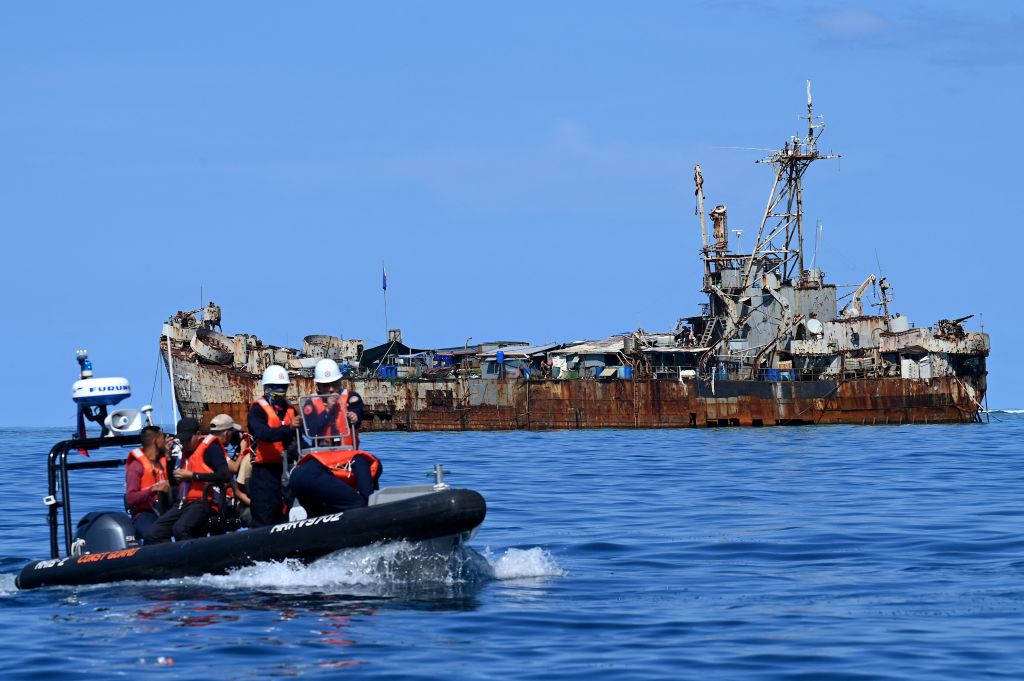The Second Thomas Shoal, within the Philippines’ exclusive economic zone, is the most dangerous flashpoint in the South China Sea.
China has ratcheted up pressure at sea to the point that the Chief of Staff of the Philippine Armed Forces argues China’s behaviour should no longer be referred to as “grey zone”, but “illegal, coercive, aggressive and deceptive”.
Of these four attributes, China’s deceptive conduct has received little attention outside the Philippines.
Yet China’s behaviour is a textbook case of disinformation, aimed at sowing discord in Philippine domestic politics, and undermining support for Manila in the region.
A misleading narrative
China’s efforts to rewrite history and law in the South China Sea have long precedent. Its claims to historic rights within the nine-dash line and over the South China Sea islands have been debunked by both scholars and the ruling of the 2016 arbitral tribunal.
Since mid-2023, China has supplemented its battery historic claims with a series of fabrications intended to sow division and disunity in the Philippines and undermine Manila’s regional standing. Its recent fabrications include:
- That the Philippines promised to remove the rusting hulk of the beached former warship BRP Sierra Madre from Second Thomas Shoal. While China had previously raised this claim in 2014 and 2016, its repetition in August 2023 appeared to cause genuine confusion and surprise in Manila. China has never provided evidence for this claim.
While Philippine journalists are active in scrutinising China’s claims, top-level international media outlets give little coverage except during periods of heightened tensions at sea.
- That the current administration of Ferdinand Marcos Jr was bound by a “gentleman’s agreement” made by the former Duterte administration. According to China and the spokesperson for the former Philippines president, the gentleman’s agreement was a quid pro quo, whereby China would allow resupply of the Sierra Madre as long as the Philippines did not repair or reinforce the vessel (without which, the vessel would have eventually disintegrated).
- That it would release an audio recording and transcript of a phone call between a Chinese diplomat and a senior officer in the Armed Forces of the Philippines in which the two agreed to a “new model” for resupplying the Sierra Madre (in the end, it showed material to selected media outlets but did not release more widely).
A cross-cutting theme in China’s criticism is that the Philippines is not honouring its “commitments” and going against “consensus”. This positions Manila as the mischief-maker, in contrast to the Philippines’ own narrative which emphasises its commitment to international law (Marcos’ Shangri-La Dialogue address last month contained the phrase “international law” eight times).

An effective narrative
China’s narrative has had an impact at two levels: in Philippine domestic politics, and in the wider Southeast Asian region.
In Southeast Asia, the Philippines has received very little overt support from its neighbours. Privately, some regional observers criticise Manila for over-playing its hand and making discussions within the Association of Southeast Asian Nations, including on a code of conduct, more difficult.
During a recent visit to the Philippines, Singapore’s Foreign Minister Vivan Balakrishnan expressed support for international law and peaceful resolution of disputes, but said little that could be construed as positive about Manila’s current strategy. Because of Vietnam’s own frontline position in the South China Sea, Hanoi shares Manila’s interest in having international attention on China’s actions on the water. The Philippines also values Indonesia’s influence and may hope that the incoming Prabowo administration would sustain a greater interest in leading maritime cooperation than has been the case under President Joko Widodo.
Increasing programs for journalists, researchers and academics from Japan, the United States and Australia to spend more time in the Philippines would be an obvious step to support international scrutiny of China’s propaganda narratives.
Some analysts argue that China’s propaganda shows it does not understand Philippine domestic politics, and has been counter-productive, by widening the rift between Beijing and the Marcos administration. The propaganda has led to a more deliberate effort by relevant Philippine agencies to bolster resilience to false narratives, for example, by encouraging media outlets and citizens to approach China’s claims with caution. Public opinion remains solidly supportive of the Marcos administration’s strategy: just ten percent of Filipinos favour working with China on the West Philippine Sea.
But as Philippine officials themselves acknowledge, China’s propaganda sows discord and division. Manila’s strategy of “many voices with one message” means that its media is flooded with repeated denials of China’s claims from Marcos himself down to agency spokespeople. A vocal minority of online influencers plug pro-Beijing messages. And divisions over China play into a feud between the Duterte and Marcos dynasties, though it is notable that Marcos himself has sought to play this down.
Support for the Philippines
Over the past two years, the United States and its allies, especially Japan and Australia, have been keen to support the Philippines through increased bilateral cooperation, especially on defence and maritime affairs, but also on economic issues that Manila values.
When it comes to the information domain, however, more can be done to coordinate support for the Philippines. For example, while Philippine journalists are active in scrutinising China’s claims, top-level international media outlets give little coverage except during periods of heightened tensions at sea. Increasing programs for journalists, researchers and academics from Japan, the United States and Australia to spend more time in the Philippines would be an obvious step to support international scrutiny of China’s propaganda narratives.
Above all, the emphasis should be on supporting the Philippines’ own approaches and strategies. Counter-China messaging from the United States or other external countries would only backfire, fuelling narratives of “major power competition” rather than focusing attention on China’s transgressions.

